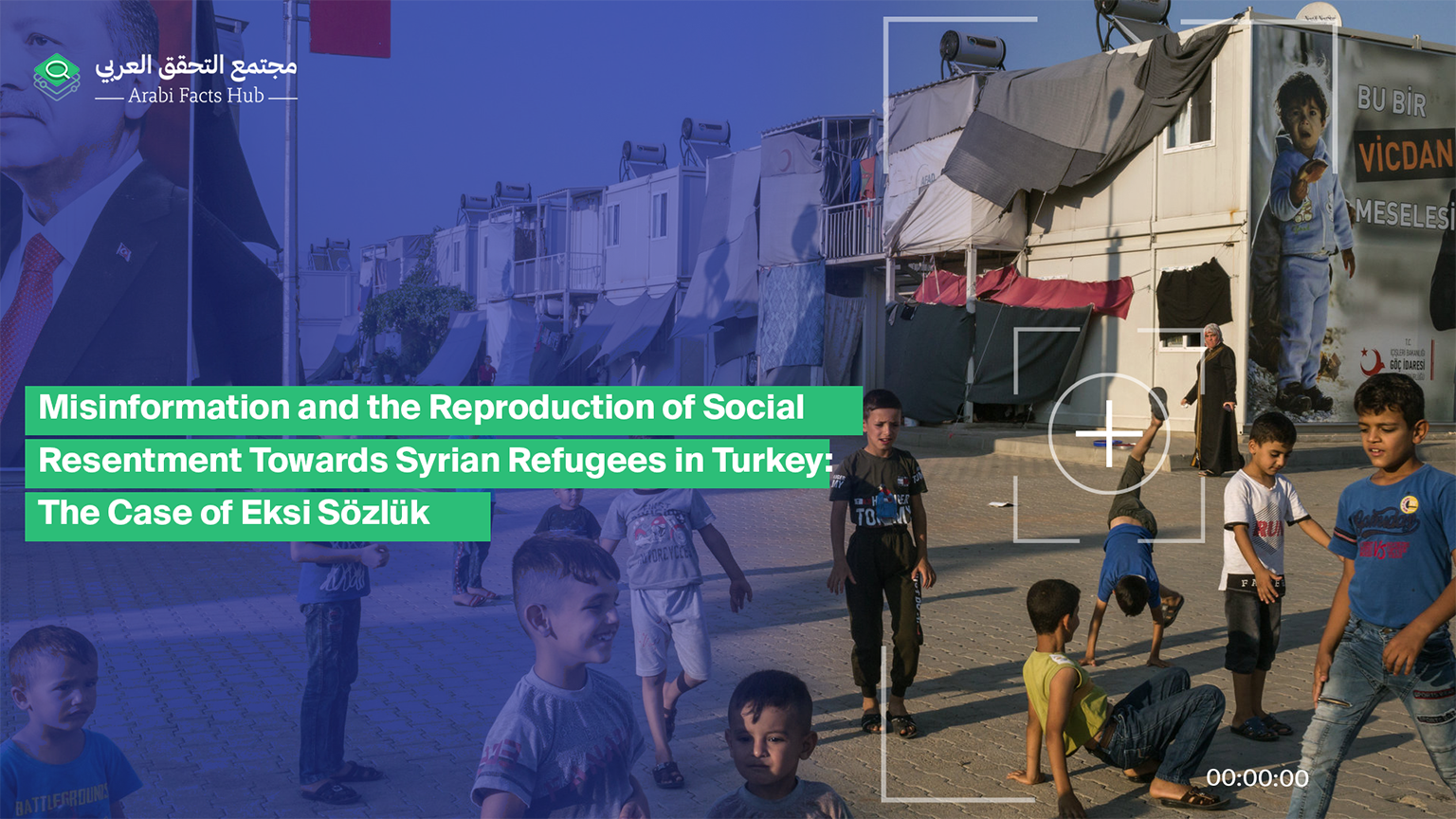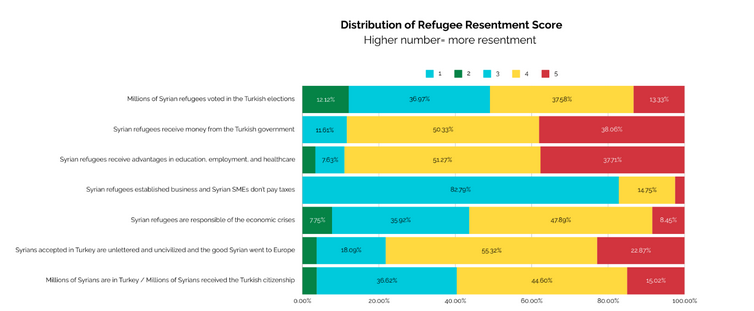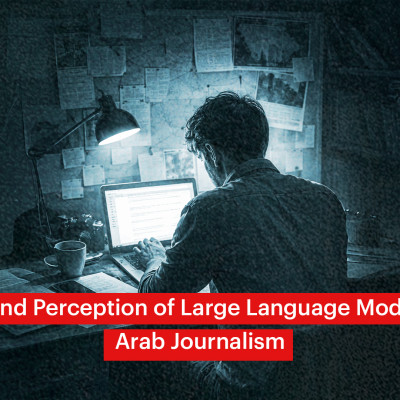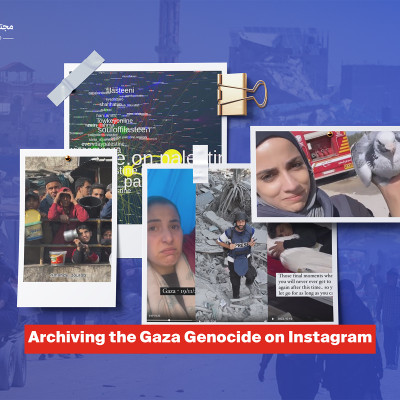Dr. Asma Hedi Nairi
is a researcher and human rights activist based in Turkey, specializing in migration studies, diaspora studies, and discourse and communication analysis. Currently investigating populist narratives, social and mainstream media biases, disinformation, and their impact on people on the move and migrant communities in the Middle East.
Misinformation and the Reproduction of Social Resentment Towards Syrian Refugees in Turkey: The Case of Eksi Sözlük

Since 2019, Turkey has experienced a marked surge in xenophobic attitudes toward Syrian refugees, with incidents escalating into acts of violence this past summer. Over the past five years, disinformation has been strategically employed by populist political figures to fuel anti-refugee sentiment. These actions have significantly contributed to the widespread dissemination of misinformation within Turkish society, exacerbating tensions and deepening societal divides – which could prove even more destabilizing after the historic fall of Bashar al Assad's regime on December 8, 2024.
In this context, social media and online platforms — spaces of largely unregulated discourse — serve as significant indicators of public misconceptions and the growing resentment toward Syrian refugees. Misinformation circulating on these platforms often distorts the realities of Syrian refugees, creating and reinforcing negative stereotypes that harm both the refugee community and the broader society.
This article focuses on Ekşi Sözlük, an influential online platform in Turkey known for its participatory structure, where public discourse is shaped by user-generated content. Registered users, referred to as "writers," contribute comments on a wide array of concepts, creating a dynamic and ever-evolving repository of information. The misinformation surrounding Syrian refugees on this platform serves as an indicator of the widespread misinformation within Turkish society.
According to Alexa's internet usage survey in 2022, the website www.eksisozluk.com ranked tenth among the most visited websites in Turkey. The platform boasts hundreds of thousands of new entries per day and reaches approximately two million page views daily, underscoring its extensive reach and engagement. Among social media platforms in Turkey, Ekşi Sözlük stands out as one of the most utilized sites and holds the top position among participatory dictionaries. Considering its substantial user base and accessibility, Ekşi Sözlük has a powerful capacity to set and influence the national agenda. Over the years, it has gained significant popularity, often determining Turkey's public discourse — which, unfortunately, can also lead to the incitement of hostility or violence.
By exploring the nature and elements of perpetuated misinformation about Syrian refugees in Turkey, this study investigates its impact on the reproduction of social resentment toward them. The aim is to shed light on how unchecked false narratives disrupt social harmony and exacerbate hostility toward marginalized groups, something increasingly dangeous .
Misinformation about Syrian refugees and its implications
This brief paper builds upon an extensive analysis of 2,227 comments, comprising of a textual dataset of 129,923 words published on Ekşi Sözlük between January 2021 and October 2024 — a period marked by the rise of violent xenophobic attacks against Syrian refugees and Arab tourists. The dataset was collected using web scraping techniques. Through a comprehensive thematic analysis, the study identifies the primary and recurring elements of misinformation used to frame Syrian refugees in Turkey, as detailed in Table 1. Notably, the corpus analysis identified 1,221 comments including misinformation content, constituting more than half of the content.
In addition to the prevailing negative discourse, the analysis highlights several persistent misinformation themes that significantly shape public perception and exacerbate social resentment toward Syrian refugees. To provide a clearer understanding of the implications of the misinformation, the next passage will explore the themes and contrast them with accurate information showing the reality of the situation.
|
Misinformation and allegations |
Number |
% of corpus |
% |
|
|
Millions of Syrian refugees voted in the Turkish elections |
165 |
7.41% |
Percentage of Each Misinformation Element Within the Total Misinformation Content in the Dataset |
13.51% |
|
Syrian refugees receive money from the Turkish government |
155 |
6.96% |
12.69% |
|
|
Syrian refugees enter universities without passing by any exam / Syrian refugees receives priority in employment over Turkish citizens / Syrian refugees receive free medical services and medication |
236 |
10.6% |
19.33% |
|
|
Syrian refugees established business and Syrian SMEs don’t pay taxes |
122 |
5.48% |
9.99% |
|
|
Syrian refugees are responsible of the economic crises |
142 |
6.38% |
11.63% |
|
|
Syrians accepted in Turkey are unlettered and uncivilized and the good Syrian went to Europe |
188 |
8.44% |
15.40% |
|
|
Millions of Syrians are in Turkey Millions of Syrians received the Turkish citizenship |
213 |
9.56% |
17.44% |
|
|
Hates speech and stereotypical comments |
904 |
40.59% |
Total of Misinformation Content in the Corpus |
1221 items |
|
Positive or neutral entries in relations to Syrian refugees |
102 |
4.58% |
||
|
Total of collected/analysed content |
2227 |
100% |
Table 1: Thematic analysis of misinformation elements on Eksi Sözlük
One prevalent falsehood is the claim that millions of Syrian refugees have influenced Turkish elections through voting. In reality, only a small proportion of Syrians have been naturalized, with even fewer meeting the criteria to vote. As of November 2023, the Turkish Interior Minister reported: "The number of Syrians who acquired Turkish citizenship is 237,995, and among them, the number of Syrians over the age of 18 is 156,987." Based on this, even if all the Syrians who obtained Turkish citizenship had voted, their votes would account for approximately 0.29% of the total electorate in Turkey—an amount too small to have any meaningful impact on the course of the elections or their results.
This specific element of misinformation taps into pre-existing fears of conspiracy and external interference in Turkish political processes, building on the psychological tendency to fear hidden plots that threaten national sovereignty. Such conspiratorial thinking frames Syrian refugees as not just a demographic concern, but as an imagined covert force influencing critical aspects of Turkish democracy.
By reinforcing the notion of an ideological conspiracy, this misinformation fuels anti-refugee sentiments and constructs a perception of the Syrian refugees as being a tool of foreign interference, further amplifying societal tensions. Notable examples of Turkish populist political figures who fuel these and other anti-refugee sentiments include Ümit Özdağ, leader of the Zafer Party, whose primary political agenda focuses on the 'repatriation of Syrians,' and Bolu Mayor Tanju Özcan, who has implemented discriminatory policies such as increasing utility fees for refugees.
The second most widespread element of misinformation in the collected data concerns the alleged economic burden posed by Syrian refugees. Claims that refugees receive disproportionate financial support from the Turkish government or are responsible for the country's economic crisis redirect public frustration toward an already vulnerable population. These assertions oversimplify complex economic challenges while leaving out underlying structural issues and challenges that have been faced by Turkey. After the COVID-19 pandemic, existing problems such as high inflation, currency devaluation, and unemployment intensified while also exposing gaps in policy responses and economic resilience. By focusing narrowly on surface-level explanations, these assertions miss the broader, more nuanced context of Turkey’s economic struggles in recent years. In this context of economic recession, such misinformation gains traction, reinforcing the perception of refugees as an economic threat and burden.
Misinformation about access to services and opportunities significantly amplifies perceptions of unfairness toward Syrian refugees. Allegations of preferential treatment in employment or university admissions intensify the resentment among Turkish citizens who are already facing economic hardships. Claims that Syrian refugees benefit from free medical services, which were frequently encountered in the collected corpus, further reinforce the perception that they are unfairly advantaged over Turkish citizens. These narratives deepen societal divisions and fuel conspiracy theories about a foreign plan to alter Turkey's demographic and ethnic composition, heightening mistrust and hostility within the host community.
Furthermore, accusations of tax evasion constitute another prevalent form of misinformation, suggesting that Syrian-owned businesses exploit the system by avoiding taxes. Syrian businesses contribute significantly to the economy and pay taxes both directly and indirectly. While it is true that some Syrians may operate informally due to legal and bureaucratic barriers, such misinformation undermines the recognition of refugees' economic contributions and reinforces negative stereotypes.
In contrast to this, evidence shows that Syrian refugees in Turkey have made notable contributions to the economy. By 2020, research by Building Markets estimated that Syrians had invested over USD 500 million in the country through the establishment of various commercial activities.
While each of these elements is harmful on its own, the greater danger lies in the fact that users on the platform often believe in a combination of these misinformation narratives. The thematic analysis reveals that these elements are not isolated but deeply interwoven – creating a cohesive narrative that reinforces a collective sense of injustice among the host community. The perceived sense of being wronged exacerbates social resentment, and significantly undermines efforts toward mutual understanding and integration. This dynamic is clearly reflected in the data collected, highlighting the compounding effect of interconnected misinformation.
Misinformation as a source of social resentment towards Syrian refugees in Turkey
To explore the link between misinformation and social resentment toward Syrian refugees in Turkey, a system, which will be referred to as the Refugee/Immigrant Resentment Score (RIRS) was developed and implemented as part of the sentiment analysis. The implementation of the RIRS provides a critical lens to measure these dynamics, offering insights into the intensity and spread of prejudice catalysed by misinformation. The RIRS provides a structured approach to quantify and analyse the impact of misinformation on public attitudes toward Syrian refugees in Turkey. By systematically evaluating user-generated content, especially those containing misinformation, the RIRS highlights the degree to which misinformation contributes to prejudicial attitudes and resentment within online communities.
The RIRS is a structured scale ranging from 0 to 5, with each level reflecting an increasing degree of resentment expressed in discourse:
- Level 0: Represents neutral or supportive sentiment, characterized by factual or inclusive language toward refugees. This level was not encountered in the analysis.
- Level 1: Indicates mild concern, where discourse remains respectful and avoids assigning direct blame to refugees.
- Level 2: Reflects moderate concern, often marked by subtle resentment focused on specific pressures, such as economic or social strain.
- Level 3: Captures elevated resentment, where negative stereotypes and generalized claims about refugees as burdensome begin to emerge.
- Level 4: Represents high resentment, characterized by explicit accusations, divisive rhetoric, and portrayals of refugees as threats to societal well-being.
- Level 5: Reflects extreme resentment, marked by inflammatory, hate-filled language that not only incites hostility but also calls for the initiation of hostile policies or violent attacks against refugees.
By assigning these scores to comments within the dataset, the RIRS provides a systematic way to assess how misinformation drives varying levels of resentment. The findings, visualized in Figure 1, reveal the prevalence of higher resentment levels in discourse containing misinformation, underscoring the need for targeted counter-narratives to address these harmful sentiments.

Figure 1: Perceived Causes of Refugee Resentment in Turkey on Social Media: A Distribution of Resentment Scores
The main misinformation themes that generated the highest levels of resentment represented in the RIRS are centered around economic impact, demographic change, and political manipulation. Economic concerns include unfounded assertions that refugees are taking jobs away from Turkish citizens or overburdening social welfare systems. Demographic change narratives and related misinformation, on the other hand, suggest that the presence of Syrian refugees will irrevocably alter the cultural and ethnic makeup of Turkey, enhancing fears over national identity. Further, political manipulation themes revolve around baseless claims that refugees are being used to influence election outcomes or government policies.
These leading misinformation themes resonate strongly with the public as they tap into perceived threats to personal and national well-being. Social media and user-generated content frequently amplify these misconceptions, with sensationalized and decontextualized accounts reinforcing hate speech and perpetuating negative stereotypes. Platforms like Ekşi Sözlük, known for their participatory nature and widespread use, play a significant role in spreading misinformation. Sensationalist content, which tends to attract greater attention, is more likely to gain traction and reach wider audiences. Additionally, social media algorithms, which prioritize engagement, often inadvertently promote misleading or inflammatory posts, further fuelling the spread of false narratives.
The harm of misinformation elements mapped throughout the data lies in the nature of the spread misinformation, and its ability to evoke a profound sense of injustice and betrayal among audiences. By embedding inaccuracies into plausible narratives— such as claims about refugees receiving unfair economic or educational advantages — misinformation appeals directly to the perceived grievances of the host community. This perception fosters feelings of marginalization and heightens resentment, which is then reflected in the audience's responses. The emotional resonance of the misinformation makes it particularly potent at influencing public opinion.
Notably, the analysis shows that generic hate speech or prejudicial descriptions of Syrian refugees often provoke less engagement and fewer emotionally charged responses. While hate speech undoubtedly contributes to the normalization of hostility, it lacks the potent emotional triggers —such as perceived economic or political threats — that misinformation elements introduce. Consequently, hate speech, though harmful, does not generate the same ripple effect of resentment through user interactions. This distinction highlights the specific and intensified impact that misinformation has on social attitudes, compared to other forms of negative discourse. This could be explained by the fact that hate-speech-focused content does not add any details or false claims that might deepen users' feelings of anger or fear. Instead, it primarily relies on negative descriptions or derogatory language, which may reinforce existing prejudices but fail to create new reasons for outrage.
In contrast, comments that include misinformation introduce new, often fabricated elements — such as claims of resource competition, security risks, or cultural invasion — that give readers additional grounds for resentment. Even if other users have previously encountered the same misinformation from other sources, seeing it reiterated makes it appear more credible, reinforcing its perceived validity. This process transforms what might initially have been a grey area or uncertain claim into a perceived reality, further fueling resentment and emotional engagement. This not only amplifies the anger of the comment’s originator but also spreads to other users who accept and react to the misinformation as truth, resulting in a heightened collective hostility. Therefore, misinformation serves as a more effective tool in perpetuating resentment and antagonism in online discourse.
The analysis shows that misinformation operates as a multiplier of social resentment by distorting realities and exacerbating existing anxieties within host communities. While some comments and a few authors (4%) on the platform attempted to counter misinformation by providing explanations and references to facts and statistics, their efforts were largely disregarded. Instead, these users often faced even higher resentment scores, being labelled as traitors by others. This suggests that the persistence of misinformation is not solely due to a lack of alternative narratives, but stems from a willingness among some users to embrace false claims that align with their pre-existing fears and biases.
Additionally, the involvement of political figures in spreading misinformation about Syrian refugees further exacerbates the issue. When such misinformation comes from individuals in positions of authority, it gains a veneer of credibility that makes it more persuasive to the public. This endorsement legitimizes false narratives, giving them a sense of certainty and encouraging the public to accept and share them without scrutiny. As a result, misinformation fosters a divisive environment where discrimination becomes socially acceptable, and prejudiced attitudes toward refugees are framed as a heroic act of self-defence or protection of the nation.
Recommendations and conclusion
This study demonstrated that misinformation is not merely a distortion of facts, but an active force that intensifies prejudice and hostility toward marginalized groups. Analysing user-generated content and employing the Refugee/Immigrant Resentment Score (RIRS) revealed how false narratives fuel social resentment, undermine integration, and destabilize societal cohesion in Turkey. Misinformation preys on economic anxieties, fears of political manipulation, and concerns about cultural preservation, transforming latent discontent into active hostility and fostering a divisive "us versus them" mentality.
Although initiatives by the Turkish Presidency of Migration Management and civil society organizations have sought to counter the spread of misinformation, they remain insufficient to address the scale and persistence of the problem. Misinformation continues to circulate widely, exacerbating tensions and hindering integration efforts.
To combat this issue, a comprehensive and multi-layered approach is essential. This includes implementing policy interventions to regulate false content on social media, establishing collaborative fact-checking mechanisms, and promoting positive narratives through media and influencers to counter stereotypes. Failure to act risks further erosion of societal cohesion and presents an escalating threat to refugees in the country, making collaboration among stakeholders — government, social media platforms, civil society, educators, and community leaders — imperative. The lack of widespread engagement with counter-narratives, combined with political figures' figures and media outlets' outlets' active reinforcement of misinformation, poses a significant challenge to creating a more informed and empathetic public discourse. Misinformation must be addressed at multiple levels, not only within online spaces, but also through policy reforms, media literacy programs, and public awareness campaigns.
In addressing the root causes of misinformation, it is essential to recognize the collective psychological drivers behind spreading falsehoods, necessitating a multi-pronged approach to combating misinformation. Governments, social media platforms, and civil society organizations should collaborate to create more effective fact-checking mechanisms, enhance media literacy, and promote inclusive narratives that counteract stereotypes. Additionally, fostering dialogue and mutual understanding between refugees and host communities is essential in breaking down the barriers of mistrust built up through misinformation. Efforts to promote refugee integration should focus not only on addressing material needs, but also on challenging the social prejudices and negative perceptions that hinder refugees' full participation in society.
Finally, the importance of adopting a long-term, proactive strategy to address the problem of misinformation is evident at this stage – particularly as it has already been able to go beyond the digital space and reach the streets in the form of material threat and violence. While immediate interventions may have limited impact, especially in an increasingly uncontrollable digital space, sustained efforts to combat disinformation through more fundamental approaches, including education, regulation, and community engagement will be vital in changing the narrative around refugees and ensuring a more inclusive and just society. Without such efforts, the persistence of misinformation and its consequences may continue to undermine social cohesion, potentially escalating to new levels of harm — especially in the aftermath of Assad's regime which leaves Turkish society in a state of uncertainty, anxiously awaiting what the future may bring.
By addressing the root causes of resentment and implementing well-structured and strategic measures, Turkey can move toward a future where refugees are viewed not as threats, but as valuable contributors to the nation's social and economic fabric.





